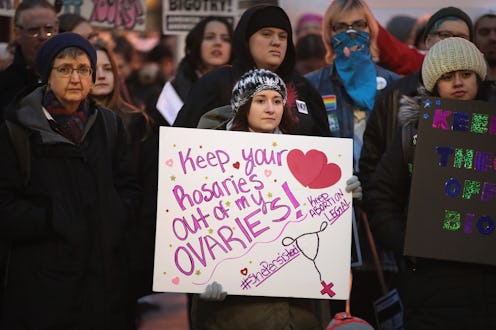News
Trump Is Hiding Public Comments That Criticize Rules On Abortion & Transgender Health

Of the more than 12,000 public comments the Department of Health and Human Services (HHS) received on a proposal that could effect women's and transgender people's health services, only 80 have been posted. While most of those posted are in favor of the proposal, Politico reported that the comments criticizing the HHS' abortion and transgender policy have been withheld, adding to a lack of transparency within the Trump administration that could lead to legal challenges.
The proposed HHS rule in question would remove regulations on religious and faith-based organizations, which opponents of the plan worry could allow religious groups to deny health care services to certain patients. For example, Catholic hospitals saying they object to abortions for religious reasons and refusing to provide them, even in life or death situations.
The Administrative Procedures Act requires federal agencies to seek public comments on new proposed rules, which are then to be posted online. While the Trump administration did post some comments, they amounted to less than 1 percent of the comments received — and the agency hand-picked the ones released, according to Politico's sources. The agency denies this. HHS's Center for Faith-based and Neighborhood Partnerships director, Shannon Royce, said in a statement to Politico, "There has been a voluminous response to the [request for information], and the center’s team is working through a review of the submissions." Bustle has reached out to HHS for further comment.
HHS's online description of the proposed rule says it's intended to "remove regulatory or other barriers in order for these institutions to participate in HHS-funded or regulated programs," "strengthen partnerships with faith-based organizations," and "ensure faith-based organizations are affirmatively accommodated and not excluded from publicly funded or conducted programs." It was open to public comment through Nov. 24.
Organizations that oppose the rule fear it would enable faith-based health centers to deny service to transgender patients or use religious objections to block women from getting abortions. HHS reportedly hiding comments highlighting these worries only concerned those in opposition more.
"You cannot improve bad policy by hiding public criticism," said Dana Singiser, vice president of public policy and government affairs for Planned Parenthood, in a statement provided to Bustle. "You cannot garner public support by erasing the voice of everyone who disagrees with you. The Trump-Pence administration has stacked HHS with people so hell-bent on pursuing their own ideology that their actions are bordering on incompetence."
The Trump administration could not only be in violation of the Administrative Procedures Act, but also the First Amendment. Rachael Klarman, a lawyer with Democracy Forward, told Politico HHS seems to have prioritized comments in favor of its proposal. "The government can’t discriminate in a public forum," she said, adding that some recent case law "would suggest that’s a pretty big problem under the First Amendment."
While others argue that it doesn't matter whether the agency posts all the comments or not, since it could still institute the rule regardless of how negative the comments are, withholding critical comments would further undermine HHS's transparency. The agency already received backlash last week when the Centers for Disease Control and Prevention banned officials from using the words "transgender" and "fetus" in next year's budget, according to The Washington Post. HHS has also not yet released public comments on a draft of the agency's strategic plan released in October that said life begins at conception.
The agency still has time to release the more than 12,000 comments on its rule seeking to remove barriers for religious organizations to receive public funds, and organizations critical of the proposal want to see their submissions made public. They are called public comments for a reason.